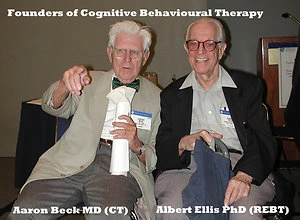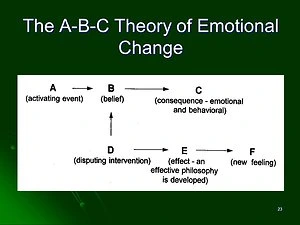What are Cognitive Behavioural Therapies?
Aaron Beck and Albert Ellis developed separate but similar approaches to treatment in the middle of the last century which are now covered by the umbrella term Cognitive Behavioural Therapy.
My speciality is Rational Emotive Behavioural Therapy (REBT), the Ellis model. The underlying principle is that it is not events in themselves which cause us to react in a particular way, but how we perceive those events; our perception may lead to cognitive, behavioural and emotional disturbance.

This idea has a long history: the Stoic Epictetus wrote, in the first century AD:
‘Men are disturbed not by things, but by the views which they take of them’.
Very broadly speaking, whereas ‘pure’ CBT concentrates on changing behaviours, thoughts and emotions, REBT recognises the central importance of the beliefs underlying and informing these reactions and seeks to shift these beliefs towards a more flexible, rational outlook; it’s the difference between using a sticking plaster and examining the underlying wound. The result is a more fundamental shift in thinking, which may ripple outwards into other areas of your life, in addition to the presenting problem.
REBT is a goal orientated, focussed, time-limited therapy. Its aim is to help you achieve specific goals and to enable you to develop skills which you can take into your life after the therapy has ended. The average number of sessions is usually between ten and fifteen, although this is flexible and open to review as the therapy progresses.
What sort of things can REBT be used to treat?
REBT is used to treat specific things which are affecting you in the present, including:
- Anxiety
- Depression
- Insomnia
- Irritable Bowel Syndrome
- Obsessional Compulsive Disorder
- Panic attacks
- Eating disorders
The past is not ignored; many underlying beliefs may have their roots in your past experiences.

What will happen when I come to see you?

In the first session I will take a detailed case history. From this, we will agree on a target problem, and then work on this within the A-B-C framework, which you can see in the picture. The therapy follows a process; in my experience, this focussing on the very specific sometimes has the effect of uncovering fundamental core beliefs which may underlie many other areas of my clients’ lives, in addition to the problem at hand.
As your therapist, my first concern will be to create a safe, boundaried space for you. When the work starts, I will be quite directive, and my role will be to guide you through the process and give you educative information about how this works. As therapy progresses, the balance will shift to you, the client; part of my job is to enable you to, in effect, be your own REBT therapist with regard to your life.
There will be homework! This is an important part of your learning and processing between sessions. It will be challenging but not overwhelming, and tailored to your specific needs both as an individual, and according to what stage the therapy has reached.
Do I have to come and see you face to face?
I prefer to see clients face to face. However, if travelling is difficult for you, we may be able to conduct sessions by Zoom or telephone.
All CBT/REBT work is held within the framework of my primary training as a psychotherapist, as part of my integration.

